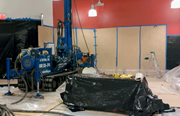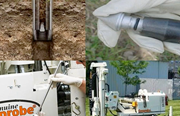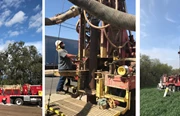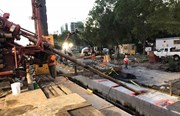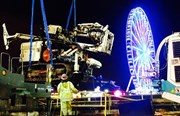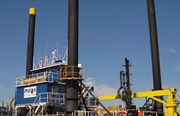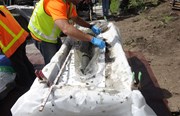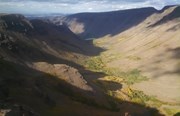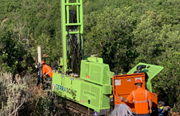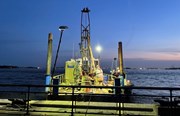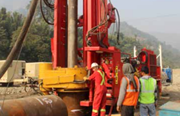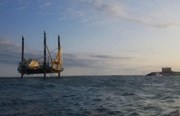6 Reasons to Start Your Career in Drilling
By: Cascade EnvironmentalWhether you’re looking for your first real job or feel like it’s time to switch career paths, it’s hard to know if a new industry is going to be a good fit for your skills and priorities. No one wants to jump in blind. In this blog post, we’ll cover six reasons you should consider a career in drilling.
REASON #1: YOU HAVE HIGH EARNING POTENTIAL
Let’s cut to the chase—no one works for free, and we all want to know that we can earn enough to take care of ourselves and the people we love. According to Talent Acquisition Director Jessica Alexander, field personnel working as drillers or probe operators can expect to be compensated well.
“It’s actually very realistic to earn in the six figures once you factor in overtime and per diem, and as you progress in your career that only increases,” she said. “In fact, most of our senior leadership started out in entry level drilling jobs—even our CEO, Ron Thalacker, was a driller assistant when he first started.”
Research from ZipRecruiter backs Alexander up. According to their stats, the average environmental driller in the US makes $73,147 annually. That number can go up or down based on variables like location and experience, as well as certifications, specializations, etc.
REASON #2: YOU DON’T HAVE TO SIT BEHIND A DESK
Some people are wired to be moving and to work with their hands—and if that’s you, a desk job might be your worst nightmare.
Regional Estimator Trent Castner believes working in drilling offers a lucrative alternative.
“Drilling is a physically active career. It’s outside, and everyone is always moving as part of the work,” he said. “It can be really fulfilling to know you’re either improving the environment or being part of constructing bridges, buildings, dams, etc. Because many projects are less than a week long, you also end up going to new places and seeing new things, which keeps the job fresh.”
REASON #3: YOU CAN BE A FORCE FOR GOOD
It’s not uncommon for people to mention the sense of purpose their job in environmental services gives them. Like Castner said, cleaning up contaminated soil and groundwater or helping to ensure the safety of vital infrastructure can be rewarding work. Probe Operator Cody Spiker agrees.
“We are the unsung heroes at the forefront of cleaning this planet from ourselves,” he said. “If you want to get your hands dirty and stop talking and start fixing these environmental issues mankind has created in the last century, this is a good way to get started.”
REASON #4: THE WORK IS STEADY
Some types of work, like construction, can be heavily impacted when the economy is down. Because the drilling industry focuses on projects involving public safety—such as testing to see if water is too contaminated to drink, or ensuring a bridge is built in a safe location and securely anchored—projects are less likely to be put on hold or canceled.
“Even through a pandemic, we’ve continued our work,” Alexander said. “It’s a steady industry that is critical to safety and infrastructure, and not likely to decline anytime soon.”
Steady work means better job security and advancement opportunities for solid employees.
REASON #5: MENTORSHIP OPPORTUNITIES
Although there are a few schools around the world that offer driller training, they are few and far between. In this industry, many roles are learned on the job—so mentorship is critical to a person’s career growth. More experienced drillers don’t see newer drillers as competition, because they know they have an in-demand niche skill set and there’s plenty of work for anyone who has it, too. They’re happy to share what they’ve learned.
Frank Egan says that mentorship was a key to his success as a Technical Specialist. “A lot of mentorship comes from the older drillers,” he said. “They’ve taught me how to determine the type of material I’m drilling in, or when I’m hitting rock. They’ve also shown me that no matter how good you are at your job, there is always something to be learned.”
Mentorship is important, and many drillers and operators are eager to give back.
Spiker is one example. “I came into this company as a very ‘green’ drilling helper with no prior knowledge of environmental remediation and reclamation,” he said. “But I was very fortunate to have a few specific individuals who trained me about the nuances of drilling, first as a helper and then on a path to becoming a driller. […] I recently have had the opportunity to guide new employees. Being able to mentor these newer employees has helped me come full circle and to contribute to the company and repay those who helped me.”
REASON #6: TRAVEL THE COUNTRY
One of the most exciting aspects of a drilling career can be the travel. Want to see the world? Drilling may give you just the opportunity!
Depending on the company you work for you, you may be asked to drill across your region, country—or even on the other side of the globe. Castner says he enjoyed the travel when he worked as a driller.
“Travel is a plus, just being able to go to interesting places that are often off the beaten path,” he said. “The crews’ lodging, meals and plane flights are covered by the company, so you get to see new things and meet new people without spending your own money.”
During his drilling days, Castner worked on locations in Alaska, Washington, Oregon and Montana. Others have worked on sites ranging from tropical islands to National Forests. Many drilling locations are in remote and pristine areas that are inaccessible for anyone but the drilling crew.
Careers in the drilling industry involve a lot of hard work, strong motivation, and a willingness to learn and adapt. It isn’t for everyone. But if you’re intrigued, you can learn more on our Careers hub.





